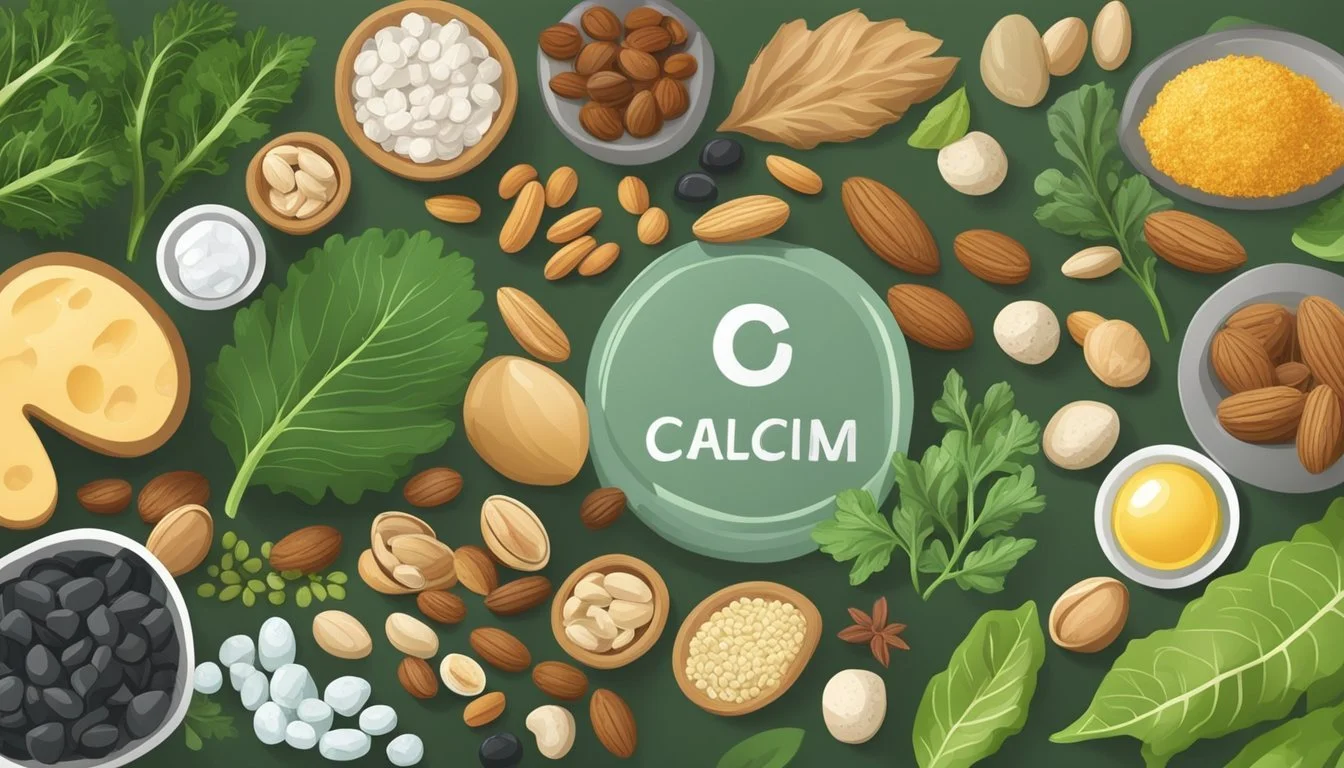Iron and Copper-Free Multi-Mineral Supplements
Ideal for Carnivore Diets
Multi-mineral supplements without iron and copper are gaining popularity among those following a carnivorous diet. These supplements are formulated to offer essential minerals that support overall health without the potential risks associated with excessive iron and copper intake. For individuals concerned about heavy metal toxicity or who already receive adequate iron and copper from their diet, these supplements provide a balanced alternative.
Products like the Multi-Mins Iron & Copper Free from Biotics Research include a mix of mineral chelates and trace minerals combined with antioxidant enzymes such as SOD and catalase. This combination can help improve energy levels and support various bodily functions. Their carefully selected ingredients ensure that those strictly adhering to a carnivore diet can still receive a diverse range of vital nutrients.
In addition, Nordic Naturals have introduced multi-mineral capsules that offer 9 essential minerals to support cellular health and overall wellness. These supplements are designed to be easily absorbed and utilized by the body, making them an ideal choice for anyone looking to maintain optimal health without the complications of excess iron and copper.
The Importance of Mineral Balance
Maintaining a balanced intake of minerals is crucial for optimal health, especially in a carnivorous diet. There are specific risks associated with iron and copper in dietary supplements, and certain essential minerals must be included to meet dietary needs.
Risks of Iron and Copper in Supplements
Excess iron in supplements can lead to toxicity, particularly in individuals with conditions like hemochromatosis. Too much iron can cause symptoms such as abdominal pain, joint pain, and in severe cases, organ damage.
Copper imbalance is another concern in supplement use. High levels can result in gastrointestinal distress and liver damage. People consuming a carnivorous diet, which is often rich in iron from meat, may not require additional iron supplements.
Key Points:
Iron Toxicity: Abdominal pain, joint pain, organ damage.
Copper Imbalance: Gastrointestinal issues, liver damage.
Essential Minerals for Carnivorous Diets
Calcium, potassium, manganese, and zinc are vital minerals that can support those on a carnivorous diet. Calcium is necessary for bone health and muscle function. Potassium helps manage fluid balance, nerve signals, and muscle contractions.
Manganese plays a role in bone formation, blood clotting, and reducing inflammation. Zinc supports immune function and protein synthesis. These minerals are essential to complement the high protein intake of a carnivorous diet while avoiding the risks associated with excess iron and copper.
Key Points:
Calcium: Bone health, muscle function.
Potassium: Fluid balance, nerve signals.
Manganese: Bone formation, inflammation reduction.
Zinc: Immune support, protein synthesis.
Make your life easier by ordering calcium, potassium, magnesium, and zinc online; it's just a few clicks away!
Understanding Multi-Mineral Formulations
Iron and copper-free multi-mineral supplements offer unique benefits, particularly for individuals on a carnivorous diet. Key aspects such as mineral synergy, absorption, and the use of chelated and phytochemically bound minerals play pivotal roles in these formulations.
Synergy Between Minerals and Absorption
Each mineral in a multi-mineral formulation works best when combined effectively with others. For example, calcium and magnesium should be balanced to optimize absorption and utilize each mineral's benefits.
Example of Synergistic Minerals:
Mineral A Mineral B Benefits Calcium Magnesium Enhances bone health, regulates blood pressure Zinc Vitamin C Boosts immune system, promotes skin health
The absence of iron and copper in specific formulas can prevent potential competitive inhibition, ensuring other crucial minerals are absorbed more efficiently.
What Makes a Mineral Chelate
Mineral chelation involves binding minerals to organic molecules, which can improve their absorption. Chelated minerals are more bioavailable because the body recognizes and absorbs the chelate complex efficiently.
Key Chelated Minerals:
Calcium Bisglycinate: Better absorbed than standard calcium carbonate.
Magnesium Glycinate: Known for its high absorption rate and minimal digestive discomfort.
Zinc Picolinate: Exhibits superior absorption, enhancing its utilization in the body.
Chelated minerals reduce the interaction with dietary components that may inhibit absorption, making them crucial in multi-mineral supplements.
Advantages of Phytochemically Bound Trace Minerals
Phytochemically bound trace minerals are paired with plant-based compounds, facilitating better uptake and utilization. These trace minerals mimic how they are naturally found in food, increasing their effectiveness.
Examples of Phytochemically Bound Trace Minerals:
Trace Mineral Phytochemical Source Improved Benefits Selenium Broccoli extract Enhances antioxidant capacity Chromium Brewer's yeast Improves blood sugar control
In supplements like Multi-Mins™ Iron & Copper Free, combining these bound trace minerals with antioxidant enzymes such as SOD and catalase further enhances their protective effects against oxidative stress, making these supplements particularly beneficial for overall mineral balance and health.
Comprehensive Ingredient Profiles
Iron and copper-free multi-mineral supplements are designed to provide essential nutrients without the inclusion of iron and copper, focusing instead on a balanced combination of major minerals, trace minerals, and specialized compounds to support overall health and well-being.
Major Minerals Without Iron and Copper
These supplements typically include calcium, magnesium, and potassium. Calcium is supplied as calcium citrate, which is known for its high absorption rate and support for bone health.
Magnesium may be found in forms such as magnesium citrate, glycinate, or gluconate, essential for muscle function and energy production. Potassium, often included as potassium chloride, plays a crucial role in maintaining electrolyte balance and proper cellular functions.
Significant Trace Mineral Inclusions
Trace minerals, though needed in smaller amounts, are vital for various physiological functions. Iodine, usually derived from kelp, supports thyroid health. Zinc, often provided as zinc citrate, is crucial for immune function and wound healing.
Selenium and manganese, delivered as selenium and manganese gluconate respectively, offer antioxidant properties and support for metabolic functions. Chromium helps regulate blood sugar levels, and molybdenum aids in the metabolism of amino acids. These elements ensure comprehensive nutritional support.
Specialty Compounds and Enzyme Support
In addition to minerals, these supplements incorporate specialty compounds and enzyme support to enhance nutrient absorption and overall efficacy. Boron, often in the form of calcium borogluconate, and elements like rubidium and lithium contribute to cellular functions and mental well-being.
Antioxidant enzymes such as SOD (superoxide dismutase) and catalase protect cells from oxidative stress. The inclusion of Betaine HCl assists in digestive health by promoting efficient absorption of nutrients. These components work synergistically to support the body's numerous biochemical processes efficiently.
Benefits of Iron-Free Multi-Minerals for Carnivores
Iron-free multi-mineral supplements offer notable advantages for carnivores, especially in supporting metabolic functions and enhancing digestive health. They also aid in optimizing antioxidant defense systems, making them a valuable addition to a carnivorous diet.
Supporting Metabolic and Muscle Functions
Iron-free multi-minerals support metabolic health and muscle functions by providing essential nutrients without the excess iron that many carnivores may already obtain through their meat-based diet. This balance helps prevent potential iron overload while ensuring the body receives necessary trace minerals.
Key minerals such as magnesium, calcium, and potassium contribute to muscle contraction, nerve transmission, and energy production. They play a pivotal role in maintaining optimal metabolic rates, promoting efficient muscle function, and preventing muscle cramps and fatigue.
Enhancing Digestive Health with Betaine HCl
Betaine hydrochloride, often included in multi-mineral supplements, aids digestive health. Carnivores can benefit from betaine HCl as it helps increase stomach acidity, facilitating better protein digestion and nutrient absorption. This is particularly beneficial for those who consume high-protein diets, as it ensures that the digestive system effectively breaks down meat and absorbs essential nutrients.
Additionally, proper stomach acidity aids in preventing digestive discomforts such as bloating and indigestion, common issues for those on a meat-heavy diet. Therefore, incorporating betaine HCl in iron-free multi-minerals can significantly enhance digestive efficiency.
Optimizing Antioxidant Defense Systems
Iron-free multi-mineral supplements contribute to robust antioxidant defense systems by including minerals like zinc, selenium, and manganese. These minerals support the function of antioxidant enzymes such as superoxide dismutase (SOD), which helps neutralize harmful free radicals in the body.
For carnivores, maintaining this antioxidant defense is crucial as the metabolic processes involved in digesting a protein-rich diet can produce more reactive oxygen species. Adequate intake of these trace minerals helps protect cells from oxidative stress, supporting overall cellular health and longevity.
Engaging healthcare professionals for advice on dosage and specific needs can further optimize the benefits of these supplements, ensuring tailored nutritional support.
Selecting the Right Supplement
Choosing the right iron and copper-free multi-mineral supplement involves evaluating quality standards, understanding supplement labels, and consulting with healthcare professionals. This ensures the selected product meets dietary needs and preferences.
Assessing Quality and Purity Standards
When evaluating multi-mineral supplements, it's crucial to assess the quality and purity standards of the product. Check for third-party certifications like USP or NSF which validate the supplement's ingredients and manufacturing processes.
Opt for supplements made from whole food sources and vegetable culture to ensure they provide adequate nutrient absorption and trace minerals in their natural form. This often leads to better bioavailability, reducing the risk of deficiencies.
Reading and Understanding Supplement Labels
Understanding supplement facts on the label is key to making an informed decision. Look for clear information about dosages and the types of minerals included. Ensure the product explicitly states it is iron and copper-free to meet dietary requirements.
Check for additional ingredients like binders or fillers. High-quality products typically avoid unnecessary additives. The inclusion of digestive aids like Betaine HCl can enhance mineral absorption. Always verify the recommended daily values to match dietary needs.
Consulting Healthcare Professionals
Before adding any supplement to the diet, consulting with a healthcare professional is essential. They can provide personalized advice based on specific health conditions, dietary restrictions, and nutrient requirements.
Healthcare professionals can also recommend specific brands or products that have been proven effective and safe. They may suggest laboratory tests to identify any deficiencies that need to be addressed.
By following these steps, individuals can ensure they select a multi-mineral supplement that effectively supports their health while excluding unnecessary elements like iron and copper.
Potential Side Effects and Considerations
When choosing iron and copper-free multi-mineral supplements, it's essential to be aware of possible side effects and special dosage requirements, especially for different age groups like children under 6 and older adults.
Identifying and Mitigating Adverse Reactions
Consumers may experience adverse reactions when taking any supplement, even those without iron and copper. These reactions can include gastrointestinal issues such as bloating, constipation, and nausea. Accidental overdose remains a significant concern, particularly with iron-containing products, which some consumers might still be using alongside multi-mineral supplements.
Accidental poisoning is a serious issue, especially for children. In 60 mg/kilograms body weight, severe cases can lead to organ failure, coma, or even death. Ensuring proper storage and dosage can mitigate these risks. Always consult a healthcare provider before starting any new supplement regimen to tailor it to individual health needs and avoid potential drug interactions.
Age-Specific Concerns and Dosages
Age-specific needs should be carefully considered when taking multi-mineral supplements. For children under 6 years old, supplements should be specifically designed for their age to prevent adverse health effects. High doses of certain minerals can interfere with the absorption of others, such as zinc, leading to potential deficiencies.
Older adults may face different challenges, such as dietary restrictions and pre-existing health conditions, that could also affect how they absorb and metabolize these supplements. It is crucial for older adults to follow dosage instructions precisely to avoid complications. They should also ensure that their multi-mineral supplements do not contain iron or copper if not needed, to align with a carnivore diet effectively.
In summary, mindful selection and careful administration of multi-mineral supplements can help maximize benefits and minimize risks across different age groups.
Procurement and Storage
When choosing iron and copper-free multi-mineral supplements, consumers need reliable purchasing options and guidance on proper storage to maintain product efficacy.
Purchasing Options and Product Availability
Iron and copper-free multi-mineral supplements are available through various retailers, both online and in physical stores. Popular brands like Biotics Research offer products with SKU codes to streamline the quick order process.
Consumers can find these supplements on websites such as Amazon or specialized nutrition retailers.
When shopping online, look for dairy-free options if you have dietary restrictions. Verify whether the supplement includes a safety seal to ensure product integrity during shipping.
Pay attention to stock availability, as items may occasionally run out, especially in high-demand periods.
Proper Storage to Maintain Efficacy
Storing multi-mineral supplements correctly is crucial to preserving their efficacy over time. These supplements should be kept in a cool, dry place away from direct sunlight.
Avoid storing them in humid environments such as bathrooms, which can degrade potency.
Use containers with tight seals to prevent moisture and air exposure. Avoid placing these bottles near heat sources like stoves or radiators.
Ensure that the storage area is out of reach of children and pets to prevent accidental ingestion. Regularly check expiration dates and dispose of any expired products appropriately to maintain effective supplementation.
Supporting Resources and Information
There are various resources available for individuals interested in iron and copper-free multi-mineral supplements. These resources include educational materials for making informed choices and communities and forums for connecting with like-minded individuals.
Educational Material for Informed Choices
Reliable educational materials can help users understand the benefits and ingredients of iron and copper-free multi-mineral supplements. Sources like scholarly articles, nutrition websites, and product guides provide crucial information on the role of mineral chelates, trace minerals, antioxidant enzymes like SOD and catalase, and the absorption aid Betaine HCl.
Users can find detailed guides on supplement websites which offer ingredient explanations and dosage recommendations. Research papers and health blogs often discuss the specific needs of different dietary patterns, emphasizing how such supplements can enhance nutrition without risking excess iron or copper intake, especially for people on specialized diets like carnivore diets.
Connecting with Communities and Forums
Connecting with communities and forums allows individuals to share experiences and gain insights from others who use iron and copper-free multi-mineral supplements. Online platforms such as Reddit, Facebook groups, and specialized nutrition forums can be valuable for peer support and anecdotal advice.
Members of these communities often share personal experiences, practical tips, and supplement reviews, contributing to a wealth of shared knowledge. Engaging in discussions about product efficacy, personal benefits, and new research findings can help individuals stay informed and confident in their supplement choices.
By tapping into these resources, users can enhance their understanding of the benefits and practicality of iron and copper-free multi-mineral supplements and foster a supportive network.












